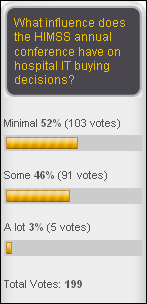A couple of years ago I had a conversation with one of my physician colleagues about how EHRs and MU…
Monday Morning Update 3/29/10
From Lazlo Hollyfeld: “Re: MedPlexus bought by GE. Now granted they likely had a pretty small install base (my bet is 300-350 providers max) but what is going to happen to practices on these ambulatory EMR systems that are inevitably scooped up by larger vendors or more likely left on their own when the tide of HIT stimulus funding inevitably reverse itself in another 18-24 months?”
From In the Cheap Seats: “Re: DocuSys. I hear its was purchased by Merge Healthcare who also bought Eko, a competitive Anesthesia EMR vendor last year. They just finished acquiring Amicas as well.” Not yet announced, but sources tell me the deal for Merge to acquire the Atlanta-based anesthesia systems vendor was signed this weekend. Maybe its tagline was a hint.
From patientsmatter: “Re: Yale-New Haven Health System. I had dinner with an executive clinical leader there last week, where it was said that today the system has three different EMRs in place, but there is a 90% chance they are scrapping them all and choosing Epic.” From my previous reports, it’s almost a done deal if the health system can work out the financial issues.
From Anodyne: “Re: Iowa Health. After more than five years of slogging through a statewide implementation of Allscripts, Iowa Health is changing vendors to the darling, Epic.” Unverified. They were already Epic on the inpatient side, right?
From Consuela: “Re: QuadraMed. Laid of 32 yesterday, mainly accounting and compliance. Makes sense due to being private and not needing the Sarbanes and SEC stuff and basic accounting functions can be handled by the VC company.” Unverified, but you are right — that would off some relief from the overhead of being a publicly traded company that wouldn’t affect customers anyway.
From Dos Equis: “Re: HIPPA. You have to love that after almost 15 years, Health Data Management misspelled it that way in the survey they sent to readers today.” Not to be overly persnickety, but they also misspelled HITECH right next to it, going lower case for some reason even though it’s an acronym. But it’s probably not the editorial people who created the survey, so I don’t read too much into it.
From UDontKnowme: “Re: Epic’s turnover. The 5% estimate is conservative. Turnover rate, specifically within implementation is well above 5% and is in more to the tune of 15-20%. The average tenure for implementation is about two years. Also, the plan for hiring 500 over the summer is in fact, lower than previous years’ summer hiring plans.”
From JoseMama: “Re: Peel’s WSJ editorial. It’s valid to critique whether we’re doing enough from a privacy standpoint, but her point of view lacked context. Are your medical records safe on a physical shelf? Or being shuttled around in a truck from facility to facility? And at least when UCLA Medical Center workers looked at Octomom’s medical record, they could track who did it and fire them.”
From Matics: “Re: informatics. You had a post by Indra Neil Sarkar, director of biomedical informatics at the University of Vermont, that ‘There are only about 2,000 to 5,000 of us who are formally certified informaticians.’ Formally certified? Certification in medical informatics does not yet exist. Perhaps he meant postdoctoral trained and/or MS/doctoral degreed?”

Deborah Peel, MD from Patient Privacy Rights was on Fox News Friday, talking about her Do Not Disclose campaign to give individuals the right to specify how their healthcare data can be used.
iSoft misses its NHS deadline to bring Morecambe Bay University Hospitals NHS Trust live.
Picis CEO Todd Cozzens writes an unusually frank criticism of healthcare reform, nearly all of which I find myself agreeing with:
Most of us who live and work in the healthcare world know that something had to be done about the uninsured, the pre-existing condition denial and other key inequalities in our system. What many of us are upset about is that bill that was cobbled together in order to get rushed through ahead of the next election, is not a cohesive, logical plan where increases in care and coverage are met with responsible funding and cost containment. The sum of these parts is an incongruous amalgamation of special interests, one-off provisions, unbridled future costs and somewhere buried deep inside are some good things for patients.
There’s a wealth of information on mobile health over at HIStalk Mobile, where David Brooks is cranking out good information on apps, hardware, and clinical usage. And if you are interested in Regional Extension Centers, find out from several vendor and consultant executives on HIStalk Practice how they expect RECs to change their business and the industry.
Somehow the results above don’t match the cost of exhibiting at HIMSS. New poll to your right, tying into : should patients be able to control how their health information is used? Note that the poll accepts comments if you’d care to argue your position.
Jobs: Sr. Applications Analyst – CPOE, Senior Manager ARRA Planning & Services, Cerner SurgiNet Consultant, Senior Systems Analyst/NextGen.
The New York Times reports that Don Berwick, president of the Institute for Healthcare Improvement, will be nominated by the President to run CMS, filling the administrator role that has been vacant since Mark McClellan quit in 2006.
Masonicare Healthcare (CT) chooses the InteGreat EHR.






Epic has a higher turnover with its road warriors. That shouldn’t come as a shock, all companies face the same battle. The truly interesting statistic to have Epic Systems release would be the turnover rate with their front line, the glorified helpdesk, Technical Support. They are the one’s who typically stay home and provide the muscle to accomplish the day to day tasks with the company. Regardless, it is a privately held company their turnover rates hardly matter, so long as they keep the quality of their products at a high enough level to prevent other vendors encroaching on market share. If the product should ever begin to slip that’s when people will take closer note of turnover rates.
I do believe you’re correct that Iowa is using Epic Systems IP suite
That was an interesting article from Todd, thanks for sharing.
Do you Mr Histalk feel that the “Do Not Disclose” movement will result in additional reform or is it merely another attempt for a politician to rally a group of people to have influence?
+++From patientsmatter: “Re: Yale-New Haven Health System. I had dinner with an executive clinical leader there last week, where it was said that today the system has three different EMRs in place, but there is a 90% chance they are scrapping them all and choosing Epic.”
Hey Patientsmatter: I am interested in what was disclosed of how much grief the nurses have to put up with with the three systems and if any mention was broached on the adverse events. Why would they want to change if patient care has been excellent and what proof is there that Epic will solve their problems?
I agree with Mr. H. that David Brooks is doing a fantastic job so far with HIStalk Mobile! Mr. H, could we get a graphic created for TPD’s List so readers of HIStalk Mobile can click on it to go to the iPhone applications on my list? TPD!
Question for Dr. Peel.
Would providers have the right to deny care if they were not allowed to have all the clinical information? Do you propose the patient determine what information is relevant?
Who would be legally responsible? The paranoid patient trying to keep his/her employer from knowing their medical condition or the Physician ordering a medication that interacts with some medication or disease that the patient didn’t disclose?
Don’t the clinicians have rights too? Don’t they have the right to have all the information known about that patient available to them?
Dear Mountain Man:
Do you really imagine that patients can be forced to give doctors ALL their medical information? Patients withhold information from doctors they don’t trust and can also simply forget information. It’s impossible to get all the information.
BUT the person most likely to know the most relevant and correct information IS the patient. That is who has the MOST at stake and the greatest motivation to be healthy.
Privacy really is important for trust and quality care. 600,000 people/year refuse early diagnosis and treatment for cancer because they know that information won’t be private, another 2 million/year refuse treatment for mental illness for the same reason. Many, many patients are harmed because medical information is used by employers to discriminate.
That’s why I founded Patient Privacy Rights–people should not have to choose between getting treatment and keeping their jobs. The lack of privacy causes far more suffering and deaths than medical errors. But the point is, patients trying to hold on to their jobs may make bad choices. We need to keep the data where it belongs–with doctors patients choose to share it with. Health information should not be a commercial commodity used to harm patients.
I work with paranoid patients. It is essential to establish trust with them and you can’t do that by force. FYI– in the courts, patients are liable for what they withhold—but doctors can deal with that by saying, “Look, if you take certain kinds of medicines that interact with what I am about to prescribe for you, it could be deadly. I know you may not want others to know you take any of the following medicines. But if you do, please let me know so we can figure out how to treat both problems safely.”
Of course, clinicians have rights to treat who they want, but the way to get the most complete information from your patients is by following the Hippocratic Oath and not revealing anything without informed consent.
NO, doctors do not have the rights to all the information known about the patient. In fact—you have a duty to tell patients that their data cannot be kept private, if it can’t. They deserve to be warned because they may be harmed.
In psychiatry and psychoanalysis it can take years for patients to tell us their deepest secrets—-we can’t force people to give up unconscious defenses. Its the same in every medical specialty–coercive demands don’t lead to trust, open communication, or quality care.
anyone know who’s running epic at temple u health?